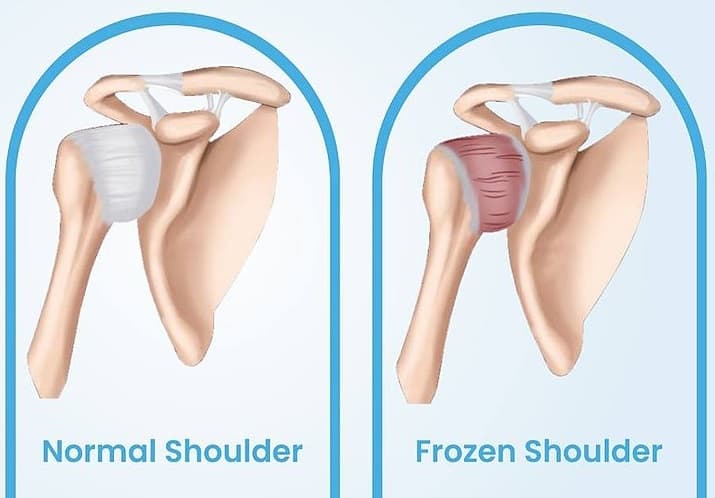Have you noticed your shoulder getting stiff and painful over time, making it hard to lift your arm or reach behind your back?
You may be experiencing a condition called Frozen Shoulder, also known as Adhesive Capsulitis.

What Is Frozen Shoulder?
Frozen shoulder happens when the capsule surrounding the shoulder joint becomes tight and inflamed.
This inflammation leads to pain, stiffness, and restricted movement, especially during overhead or behind-the-back activities.
It usually develops gradually and can last for several months if not treated properly.
- Common symptoms include:
- Increasing shoulder pain (often worse at night)
- Difficulty lifting or rotating the arm
- Limited range of motion
- Discomfort when sleeping on the affected side
How Physiotherapy Helps
Physiotherapy plays a key role in both pain relief and recovery of shoulder movement.
At Physio Link, our treatment approach includes:
- Management – Gentle manual therapy, stretching, and heat application to reduce inflammation.
- Movement Restoration – Targeted exercises to gradually improve flexibility and strength.
- Education & Posture Correction – Teaching you how to move safely during daily activities to prevent worsening symptoms.
With regular physiotherapy and proper home exercise, most patients notice significant improvement within a few months.
Consistency is the key, small daily progress leads to long-term recovery.
The Good News
Frozen shoulder is treatable!
With early assessment and guided rehabilitation, you can regain pain-free movement and return to your normal lifestyle.
If shoulder stiffness or pain is limiting your daily life, book an appointment today! Our physiotherapists are here to help you move confidently again.
References
- Lewis, J. (2015). Frozen shoulder: Diagnosis and management. BMJ, 351, h2743.
- Kelley, M. J., Shaffer, M. A., Kuhn, J. E., et al. (2013). Shoulder pain and mobility deficits: Adhesive capsulitis – Clinical Practice Guideline. Journal of Orthopaedic & Sports Physical Therapy, 43(5): A1–A31.
- Wong, C. K., et al. (2017). Clinical effectiveness of physiotherapy for frozen shoulder: A systematic review. Physiotherapy, 103(1), 1–11.

